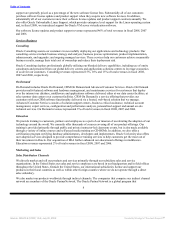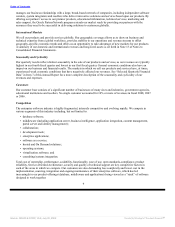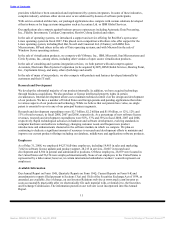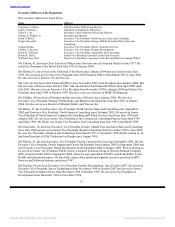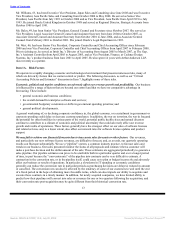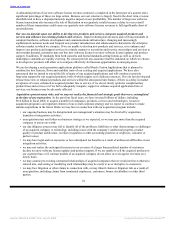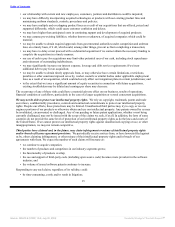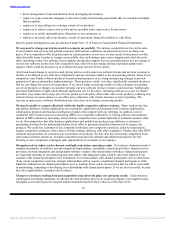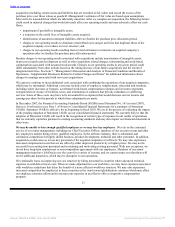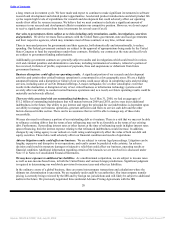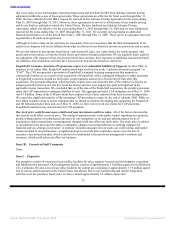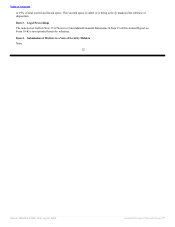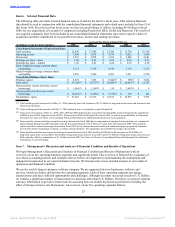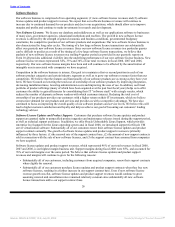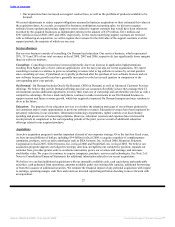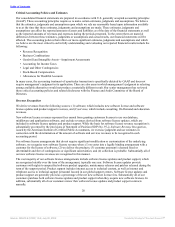Oracle 2007 Annual Report Download - page 23
Download and view the complete annual report
Please find page 23 of the 2007 Oracle annual report below. You can navigate through the pages in the report by either clicking on the pages listed below, or by using the keyword search tool below to find specific information within the annual report.
Table of Contents
Part of our total compensation program includes stock options. Stock options are an important tool in attracting and
retaining employees in our industry. If our stock price performs poorly, it may adversely affect our ability to retain or
attract employees. In addition, because we expense all stock-based compensation, we may in the future change our
stock-based and other compensation practices. Some of the changes we consider from time to time include the
reduction in the number of employees granted options, a reduction in the number of options granted per employee
and a change to alternative forms of stock-based compensation. Any changes in our compensation practices or
changes made by competitors could affect our ability to retain and motivate existing personnel and recruit new
personnel.
Our international sales and operations subject us to additional risks that can adversely affect our operating
results. We derive a substantial portion of our revenues, and have significant operations, outside of the United
States. Our international operations include software development, sales, customer support, consulting, On Demand
and shared administrative service centers. We are subject to a variety of risks and challenges in managing an
organization operating in various countries, including those related to:
• general economic conditions in each country or region;
• regulatory changes;
• political unrest, terrorism and the potential for other hostilities;
• public health risks, particularly in areas in which we have significant operations;
• longer payment cycles and difficulties in collecting accounts receivable;
• overlapping tax regimes;
• fluctuations in currency exchange rates;
• difficulties in transferring funds from certain countries; and
• reduced protection for intellectual property rights in some countries.
In addition, compliance with international and U.S. laws and regulations that apply to our international operations
increases our cost of doing business in foreign jurisdictions. These laws and regulations include data privacy
requirements, labor relations laws, tax laws, anti-competition regulations, import and trade restrictions, export
requirements, U.S. laws such as the Foreign Corrupt Practices Act, and local laws which also prohibit corrupt
payments to governmental officials. Violations of these laws and regulations could result in fines, criminal sanctions
against us, our officers or our employees, and prohibitions on the conduct of our business. Any such violations could
include prohibitions on our ability to offer our products and services in one or more countries, could delay or prevent
potential acquisitions, and could also materially damage our reputation, our brand, our international expansion
efforts, our ability to attract and retain employees, our business and our operating results. Our success depends, in
part, on our ability to anticipate these risks and manage these difficulties.
As the majority shareholder of i-flex solutions limited, a publicly traded Indian software company focused on the
banking industry, we are faced with several additional risks, including being subject to local securities regulations
and being unable to exert full control or obtain financial and other information on a timely basis.
We may experience foreign currency gains and losses. We conduct a significant number of transactions in
currencies other than the U.S. Dollar. Our revenues and operating results are adversely affected when the dollar
strengthens relative to other currencies and are positively affected when the dollar weakens. Our revenues and
operating results have recently been favorably affected by the weakening U.S. Dollar relative to other major foreign
currencies. Changes in the value of major foreign currencies, particularly the Euro, Japanese Yen and British Pound
relative to the U.S. Dollar can significantly affect revenues and our operating results.
Our foreign currency transaction gains and losses, primarily related to sublicense fees and other agreements among
us and our subsidiaries and distributors, are charged against earnings in the period incurred. We enter into foreign
exchange forward contracts to hedge certain transaction and translation exposures in major currencies, but we will
continue to experience foreign currency gains and losses in certain instances where it is not possible or cost effective
to hedge foreign currencies.
18
Source: ORACLE CORP, 10-K, July 02, 2008 Powered by Morningstar® Document Research℠


